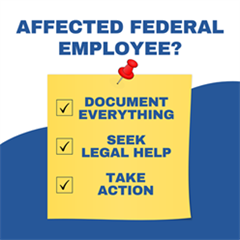Since January 20, 2025, the Trump administration has taken aggressive, sweeping actions to reduce the federal workforce. These decisions directly impact our Hawaii’s roughly 25,000-plus federal civilian workers, and indirectly federal contractors and broad parts of our community that are interlinked with our federal government’s efforts. I am closely monitoring the administration’s actions and have opposed the vast majority of them, which I believe are largely unconstitutional and unlawful (as they usurp Congress powers and/or violate existing laws, and additionally bad policy.
This webpage is to help those who are losing or may lose their jobs through no fault of their own. While federal managers and human resources employees are generally the best source of information, I want to provide direct access to resources and guidance that can help my constituents navigate these challenges.
Federal Worker Rights
As a federal employee, you have rights and remedies afforded to you by law. If you believe you are being targeted for an improper or illegal reason, you should:
- Document everything: Keep detailed records of any incidents, including dates, times and communications, that may be relevant.
- Consult an expert: Seek legal advice, either from an attorney who specializes in federal employee law or from your union if you are part of one.
- File a complaint: Depending on the nature of your situation, you may have multiple avenues to seek recourse, including the Office of Special Counsel (OSC), the Merit Systems Protection Board (MSPB) and the Equal Employment Opportunity Commission (EEOC).
If you are a government employee with information related to the politicization of the federal workforce; the firing of civil servants; or waste, fraud or abuse of taxpayer dollars, you can reach out anonymously to the Democratic staff on the U.S. House Oversight Committee.
Filing a Union Complaint
If you are in a bargaining unit, you should consider contacting your union, as there may be a negotiated set of grievance procedures.
Office of Special Counsel (OSC)
If you are a current or former federal employee or applicant, are NOT on the list of exceptions here and have been subjected by your employer to a prohibited personnel practice (employment activities banned in the federal workplace), you may have a right to file a complaint with the OSC. You can file a complaint by clicking here.
In response to your complaint, OSC can seek corrective action (meaning an action that corrects what happened to the complainant), disciplinary action (meaning an action that penalizes the agency official(s) who committed the prohibited personnel practice), or both. Note that for prohibited personnel practices covered by both OSC and the U.S. Equal Employment Opportunity Commission (EEOC), OSC generally defers to EEOC (see below).
Merit Systems Protection Board (MSPB)
If you have been subjected to adverse personnel actions not on the basis of merit but for other reasons, you may have the right to appeal the personnel action to the MSPB by clicking here.
The MSPB can help with personnel actions dealing with:
- Agency adverse actions such as removal, suspensions of more than 14 days, reductions in grade or pay or furloughs of 30 days or less; or
- Other types of actions including:
- Performance-based removals or reductions in grade,
- Denials of within-grade salary increases,
- Reduction-in-force actions,
- Office of Personnel Management (OPM) suitability determinations,
- OPM employment practices,
- OPM determinations in retirement matters,
- Denials of restoration or reemployment rights,
- Terminations of probationary employees under certain circumstances, and
- Placements or movements into excepted service positions without civil service protections.
If you file an appeal within the MSPB’s jurisdiction within the required time limit (generally 30 days but sometimes shorter), the agency that took the personnel action against you has the burden of proving that it was justified in taking the action. There are several steps in the appeal process, but at the end, you can seek review of a final MSPB decision by the U.S. Court of Appeals for the Federal Circuit.
Click here for more information about filing an appeal. Click here for a Q&A about the MSPB appeal process.
EEOC
If you have been subjected to any of the following actions, you may have a right to file a complaint with the EEOC. Click here for more information.
The EEOC can get involved if you were:
- Discriminated against based on your race, color, religion, sex (including sexual orientation, pregnancy, or transgender status), national origin, age (40 years or older), disability or genetic information.
- Retaliated against for opposing employment discrimination based on the above grounds, filing a complaint of discrimination or participating in the EEO complaint process (even if the complaint is not yours).
There are several steps in this process. The first step is to contact an EEO Counselor at the agency where you work or where you applied for a job. Generally, you must contact the EEO Counselor within 45 days from the day the discrimination occurred. At the end of the process, you have the ability to appeal a decision to the EEOC’s Office of Federal Operations or file a lawsuit in federal district court.
Filing for Unemployment Benefits
If you have lost your position, click here for more information regarding filing for unemployment insurance. Unemployment benefits rules vary by state, and federal employees generally file claims in the state in which their last official duty station was located. The State of Hawai‘i has more information available here. You can also contact my office here if you are having trouble obtaining unemployment benefits.
Operation Hire Hawaiʻi (OH-HI)
OH-HI is a targeted outreach initiative featuring an expedited state hiring process, fast-tracking qualified candidates into job opportunities throughout Hawaiʻi state government. This project aims to provide opportunities for individuals impacted by layoffs, resignations, loss of federal funding and other interested job seekers. You can learn more about OH-HI at https://dhrd.hawaii.gov/ohhi/.
Important Note
The information contained in this website is provided for informational purposes only and is intended to provide a general overview of the legal rights of federal employees as set forth by executive branch agencies with responsibility for protecting those rights, such as the OSC, the EEOC and the MSPB. The information contained in this website should not be construed as legal advice on any subject matter. For legal advice, consult an attorney. If you are in a bargaining unit, you can also consult your union.
Shutdown Frequently Asked Questions
How long will this shutdown last? It is unclear. Some shutdowns last less than a day, while the longest one, in the first Trump administration in 2018-2019, went on for over a month. Again, with mutual commitment to a bipartisan compromise, this one could be over within days. I will do my best to update you throughout this process, and again please be assured that my office will remain open.
I am a federal employee. Will I receive back pay? After the 2018-2019 shutdown, Congress passed the Government Employee Fair Treatment Act, which requires retroactive pay for furloughed and essential employees following the end of a government shutdown. Generally, benefits such as health insurance continue during a shutdown; however, federal employees may need to wait until they are returned to pay status before adjusting their benefits.
Can federal employees access their health benefits? Federal workers’ health insurance coverage will continue for the duration of the shutdown. Dental, vision and long-term care insurance will continue for two pay periods, after which federal employees will be responsible for paying premiums to maintain their benefits.
As a furloughed federal employee, can I claim unemployment benefits? Federal employees may qualify for unemployment compensation during the shutdown. Federal employees can learn more about the process here and here or contact my office directly at (808) 650-6688.
What is the impact on federal law enforcement? Federal law enforcement will also be required to work without pay for the duration of the shutdown. Although the administration has said it intends to pay law enforcement offices, it is unclear how it can legally do so.
If you have additional questions or require further assistance, please contact my Honolulu Office at (808) 650-6688 or https://case.house.gov/forms/casework/.
|
|


